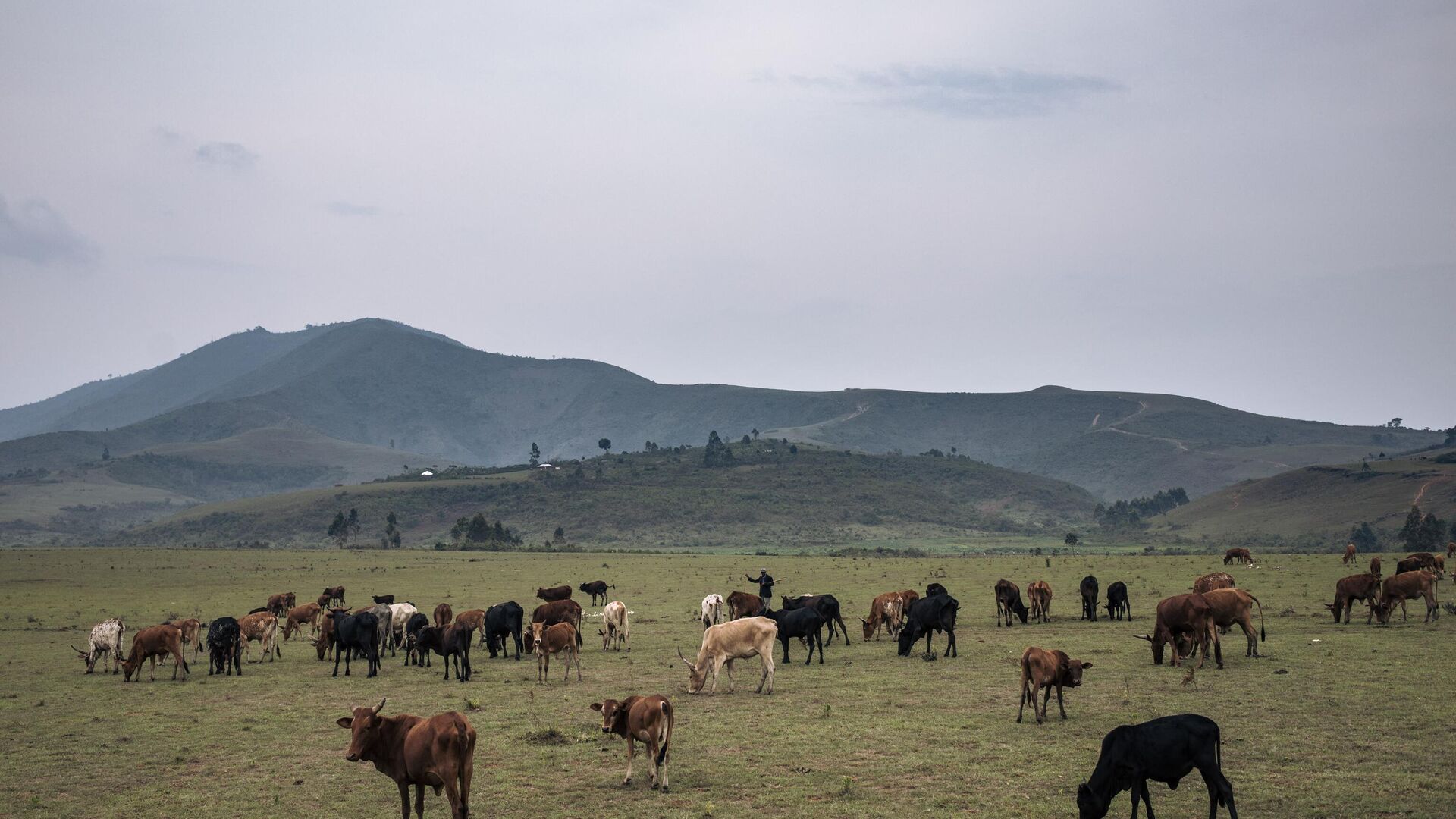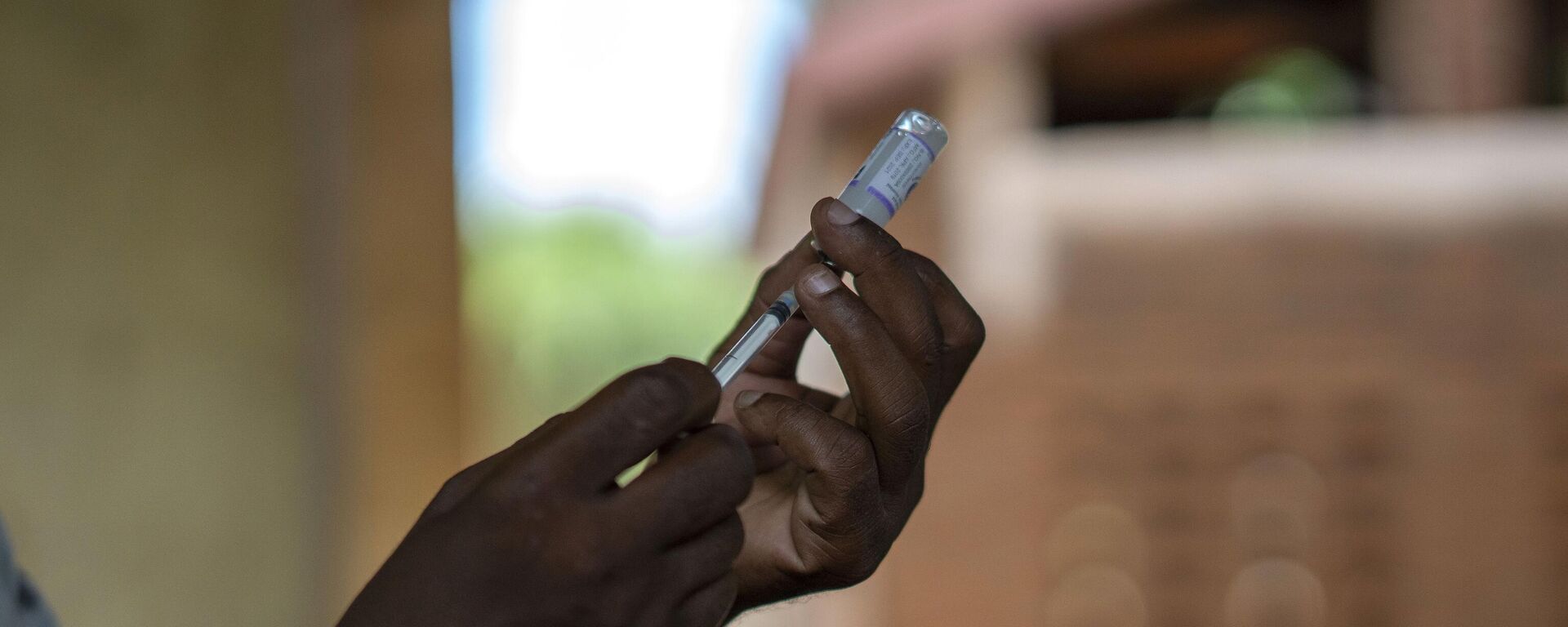https://en.sputniknews.africa/20240501/drc-reportedly-launches-large-scale-free-livestock-vaccination-in-south-kivu-province-1066314563.html
DRC Reportedly Launches Large-Scale Free Livestock Vaccination in South Kivu Province
DRC Reportedly Launches Large-Scale Free Livestock Vaccination in South Kivu Province
Sputnik Africa
The Great Lakes Integrated Agriculture Development Project for Africa (PICAGL) is a regional World Bank-funded project involving the Democratic Republic of... 01.05.2024, Sputnik Africa
2024-05-01T12:16+0200
2024-05-01T12:16+0200
2024-05-01T12:26+0200
sub-saharan africa
democratic republic of the congo (drc)
central africa
world bank
vaccine
animals
livestock
cattle
world health organization (who)
https://cdn1.img.sputniknews.africa/img/07e8/05/01/1066315391_0:160:3072:1888_1920x0_80_0_0_cc160262a9f433e400ea733aa72cbb00.jpg
Authorities in South Kivu province in the DRC have begun administering vaccinations to livestock and goats to protect animals from the effects of anthrax and small ruminant plague, the media reported on Tuesday.Bob van Romarique Katay, Communication Officer for the PICAGL, emphasized the importance of this project, as it provides much-needed “sanitary cleanup.”During this first phase, the five regions covered by the PICAGL will have access to over 734,331 doses to fight small ruminant plague and 214,961 doses to combat symptomatic anthrax. To ensure wide coverage and availability of vaccines to breeders, veterinary teams are dispersed to different locations.Safi Ngomana, a veterinarian involved in the project, noted that the campaign, by protecting animals, builds community resilience.This extensive initiative, provided at no cost, is reportedly scheduled to last for around 30 days. The following stages will implement vaccinations against infectious bovine pleuropneumonia, nodular dermatosis, brucellosis, foot-and-mouth disease, and rift valley fever in cattle in South Kivu.Vaccination is also necessary for humans. The annual World Immunization Week came to an end on Tuesday, once again highlighting the critical importance of vaccinations: about 51.2 million African people have been saved thanks to it over the last 50 years, and vaccination has helped cut infant mortality by 40% worldwide and over 50% in the African region, according to the World Health Organization.
https://en.sputniknews.africa/20240425/1066235860.html
democratic republic of the congo (drc)
central africa
Sputnik Africa
feedback@sputniknews.com
+74956456601
MIA „Rossiya Segodnya“
2024
Christina Glazkova
https://cdn1.img.sputniknews.africa/img/07e7/0b/07/1063380906_0:0:673:674_100x100_80_0_0_79628b4d0cd9f29291a57aa13bbf9e7a.jpg
Christina Glazkova
https://cdn1.img.sputniknews.africa/img/07e7/0b/07/1063380906_0:0:673:674_100x100_80_0_0_79628b4d0cd9f29291a57aa13bbf9e7a.jpg
News
en_EN
Sputnik Africa
feedback@sputniknews.com
+74956456601
MIA „Rossiya Segodnya“
Sputnik Africa
feedback@sputniknews.com
+74956456601
MIA „Rossiya Segodnya“
Christina Glazkova
https://cdn1.img.sputniknews.africa/img/07e7/0b/07/1063380906_0:0:673:674_100x100_80_0_0_79628b4d0cd9f29291a57aa13bbf9e7a.jpg
democratic republic of the congo (drc), central africa, world bank, vaccine, animals, livestock, cattle, world health organization (who)
democratic republic of the congo (drc), central africa, world bank, vaccine, animals, livestock, cattle, world health organization (who)
DRC Reportedly Launches Large-Scale Free Livestock Vaccination in South Kivu Province
12:16 01.05.2024 (Updated: 12:26 01.05.2024) Christina Glazkova
Writer / Editor
The Great Lakes Integrated Agriculture Development Project for Africa (PICAGL) is a regional World Bank-funded project involving the Democratic Republic of Congo (DRC) and Burundi. The $150 million project for the DRC aims to strengthen the economy through investment in infrastructure and agriculture in the provinces of South Kivu and Tanganyika.
Authorities in South Kivu province in the
DRC have begun administering vaccinations to livestock and goats to protect animals from the effects of anthrax and small ruminant plague, the media reported on Tuesday.
Bob van Romarique Katay, Communication Officer for the PICAGL, emphasized the importance of this project, as it provides much-needed “sanitary cleanup.”
"Breeders had long expressed the need to improve sanitary conditions in the region, as access to vaccines had become scarce. This project not only introduces new breeds, such as dairy cows, but also prioritizes the essential step of sanitary cleanup through comprehensive vaccination efforts," Katay was quoted as saying.
During this first phase, the five regions covered by the PICAGL will have access to over 734,331 doses to fight small ruminant plague and 214,961 doses to combat symptomatic anthrax. To ensure wide coverage and availability of vaccines to breeders, veterinary teams are dispersed to different locations.
Safi Ngomana, a veterinarian involved in the project, noted that the campaign, by protecting animals, builds community resilience.
"This vaccination drive offers multifaceted benefits. It not only safeguards small ruminants against diseases but also mitigates losses incurred during outbreaks. By engaging breeders and facilitating on-site vaccinations, we aim to fortify the health of livestock and foster resilience within the community," she said, as cited by the media.
This extensive initiative,
provided at no cost, is reportedly scheduled to last for around 30 days. The following stages will implement vaccinations against infectious bovine pleuropneumonia, nodular dermatosis, brucellosis,
foot-and-mouth disease, and rift valley fever in cattle in South Kivu.
Vaccination is also necessary for humans. The annual
World Immunization Week came to an end on Tuesday, once again highlighting the critical importance of vaccinations: about 51.2 million African people have been saved thanks to it over the last 50 years, and vaccination has helped cut infant mortality by 40% worldwide and over 50% in the African region, according to the World Health Organization.



